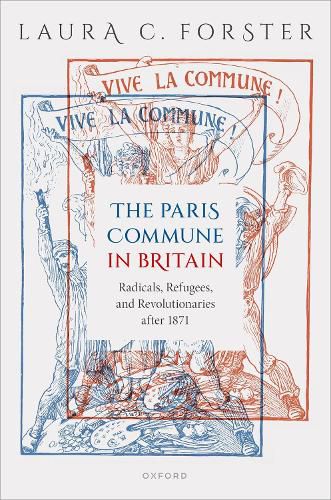Readings Newsletter
Become a Readings Member to make your shopping experience even easier.
Sign in or sign up for free!
You’re not far away from qualifying for FREE standard shipping within Australia
You’ve qualified for FREE standard shipping within Australia
The cart is loading…






Following the defeat of the Paris Commune in May 1871, thousands of Commune militants fled France to avoid imprisonment, deportation, or death. As a result, and due in large part to Britain's liberal asylum policy, around 3500 refugees arrived in Britain in the early 1870s. These exiles, and the revolution they represented, generated a widening ripple that reverberated through British political cultureThe Paris Commune in Britain is a book about radical ideas, and the people and places that make them. It is about how ideas are forged, propagated, and lived, and the mechanisms by which past radicalisms are mobilised in new presents. The focus is the political refugees who came to Britain following the defeat of the Paris Commune in 1871. Considering the intellectual impact of these revolutionary refugees and the longer cultural and political afterlives of the Paris Commune in Britain, the book reconstructs a transnational intellectual history alive to the intimate, embodied, spatial, active, and emotional contexts in which these political ideas were produced and exchanged. The book argues that the Paris Commune mattered in Britain. Its diffuse legacies operated across differing scales - from intimate friendships that prompted individual political conversions, to the production of international symbols able to galvanise a nationwide socialist movement. And these legacies waned and waxed in the decades long after the Communard refugees left Britain. In exploring these different scales of influence, the book makes broader contributions to modern British, French, and European social, cultural, and intellectual history, as well as urban history and the history of exile and migration more generally.
$9.00 standard shipping within Australia
FREE standard shipping within Australia for orders over $100.00
Express & International shipping calculated at checkout
Following the defeat of the Paris Commune in May 1871, thousands of Commune militants fled France to avoid imprisonment, deportation, or death. As a result, and due in large part to Britain's liberal asylum policy, around 3500 refugees arrived in Britain in the early 1870s. These exiles, and the revolution they represented, generated a widening ripple that reverberated through British political cultureThe Paris Commune in Britain is a book about radical ideas, and the people and places that make them. It is about how ideas are forged, propagated, and lived, and the mechanisms by which past radicalisms are mobilised in new presents. The focus is the political refugees who came to Britain following the defeat of the Paris Commune in 1871. Considering the intellectual impact of these revolutionary refugees and the longer cultural and political afterlives of the Paris Commune in Britain, the book reconstructs a transnational intellectual history alive to the intimate, embodied, spatial, active, and emotional contexts in which these political ideas were produced and exchanged. The book argues that the Paris Commune mattered in Britain. Its diffuse legacies operated across differing scales - from intimate friendships that prompted individual political conversions, to the production of international symbols able to galvanise a nationwide socialist movement. And these legacies waned and waxed in the decades long after the Communard refugees left Britain. In exploring these different scales of influence, the book makes broader contributions to modern British, French, and European social, cultural, and intellectual history, as well as urban history and the history of exile and migration more generally.